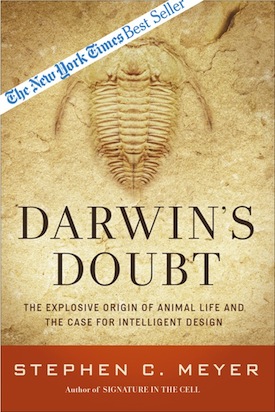 Evolution
Evolution
Darwin’s Other Doubt

Like everyone I’m reading Stephen Meyer’s new book Darwin’s Doubt. As with his Signature in the Cell, Meyer’s careful attention to the arguments is evidenced in his nearly forty pages of substantive notes. His logic and methodical reasoning is powerfully and clearly presented in every chapter.
On one level Meyer’s book is unassailable. There is no question that Darwin viewed what was then known as “the Silurian age” as a “grave” difficulty. This is a simple historical fact, notwithstanding that now Darwinists tell us the difficulty has been resolved — see the comments of Donald Prothero, Martin Poenie, and Nick Matzke. I needn’t go into the particulars of their criticisms, since others more adept than I have pointed them out here, here, here, here, and here.
That said, it occurred to me that Charles Darwin voiced a deeper doubt, of relevance to all of Meyer’s critics. In a letter to William Graham on July 3, 1881, Darwin wrote:
Nevertheless you have expressed my inward conviction, though far more vividly and clearly than I could have done, that the Universe is not the result of chance. But then with me the horrid doubt always arises whether the convictions of man’s mind, which has been developed from the mind of the lower animals, are of any value or at all trustworthy. Would any one trust in the convictions of a monkey’s mind, if there are any convictions in such a mind?
 So the lack of empirical evidence for Darwin’s notion of slow, incremental evolutionary change demonstrated in the Cambrian explosion, while significant in itself, may not be as devastating as the deeper doubt he expressed to Graham nine months before his death. What a sad note upon which to conclude one’s life — in the end, his own theory negated itself!
So the lack of empirical evidence for Darwin’s notion of slow, incremental evolutionary change demonstrated in the Cambrian explosion, while significant in itself, may not be as devastating as the deeper doubt he expressed to Graham nine months before his death. What a sad note upon which to conclude one’s life — in the end, his own theory negated itself!
The epistemological nihilism inherent in Darwin’s theory ultimately becomes the refutation of every Darwinist. If we are the chance products of Darwin’s undirected processes from our purported ape-like ancestors, what possible convictions could any of us have regarding our own “certainties” (Prothero, Poenie, and Matzke not excepted)?
Others before me have noted the self-refuting nature of Darwinism, but it is worth remembering that the Cambrian explosion wasn’t Darwin’s only doubt. Intellects governed by Darwin’s “law of higgledy-piggledy,” as the great astronomer John Herschel once called it, cannot speak with much conviction about anything. In a “higgledy-piggledy” world, what are the standards of objective truth for the “convictions of a monkey’s mind”?
Professor Flannery is the author of Alfred Russel Wallace: A Rediscovered Life (Discovery Institute Press) and other books.
